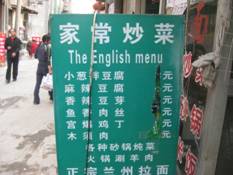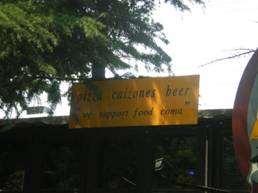Ever had one of those falling dreams where you suddenly jolt and realize you are just in bed. You look around and everything is silent. The experience leaves you quite a bit shaken. Well, this is how I would describe our third and final stop, Qinhuangdao. After traveling through bustling Beijing and antsy Xi An, Qinhuangdao was a sudden jolt of silence and solitude. Though not without its share of familiar noises like excessive car horn usage, yelling vendors and the delicate dips and tones of the Chinese language, it had the luxury of being more rural and located by the ocean. Located a four-hour train ride north of Beijing, this historical seaside port and resort is known for its pearls, seafood and summer residents, such as the late Premier Mao Zedong. The city’s location also supplied sounds of seagulls, beaching waves and giggling residents. Although it may not make sense to discuss the sense of sound in Qinhuangdao, sometimes the absence of sound in one city makes us realize the sounds we heard and might have missed in others.
Beijing Beeping
Upon arrival to Beijing, our group was inundated with noise. Whether it was from the upset passengers on our flight, the busy lost luggage counter clerk, the two money exchange ladies or the fast paced taxi drivers, our ringing ears were overwhelmed. Even our arrival was welcomed by a million car chorus of car horns extraordinaire. Well, actually, our driver just wanted to get to our hotel quickly and since he was the biggest, we honked the loudest. And so we were introduced to the game of car versus pedestrian, a seemingly daily Chinese tradition. To play, you must either be casually walking across the street or be madly gripping the steering wheel of a speeding car. Check. Now, if you are the pedestrian, be sure to ignore all crosswalk signs and don’t look both ways when you cross the road. After all, the pedestrian has the right of way. Right? If you are a taxi driver, be sure to swerve in and out of traffic belligerently, honking your horn at anything and everything within a city-wide radius. Pull up closely to cyclists and blare your horn as you cut them off. Aim directly for the elderly couple or the woman with the toddler. But, be sure to act nonchalant and ignore the pleas from your passengers to slow down. After all, once you drop them off they will become pedestrians and potential targets.
After a while, amongst this near insanity of drivers and braveness of pedestrians, you begin to relax. As a pedestrian, you learn to run. I mean haul your behind so fast you would think you were qualifying last minute for the Olympics. I became so good at jay-walking I even walked in front of the Chinese. Walking is not the time to be timid in China. As a passenger, there were a few times I thought either I or the pedestrian would be killed. Once, the driver didn’t even honk until he had bumped the pedestrian. Unscathed and unphased, the pedestrian looked sourly at the driver and continued walking into traffic. And even if traffic is at a standstill and there is no chance of moving for awhile, the taxi drivers will continue to blow those horns like they have a quota to fill. This chorus continues well into the night, even after taxi service had stopped. I guess patience is no longer a virtue. While sitting in the back, since I nearly refused to ride in the front, I thought, “Whatever happened to turning up the radio in traffic and settling in to figure out what the license plate of the driver in front really means?”
Beijing Building
In addition to the sporadic meeting of car horn quota, the incessant noise of jackhammers, reversing sirens and cranes filled the day and nighttime air. It is no secret, at least not a quiet secret that the country is in the midst of preparation for the Summer Olympics, and no city more so than Beijing. Local Chinese joke that the Chinese national bird has become the construction crane. All over the city, these national birds are constructing buildings including their own “Bird’s Nest,” a steal woven stadium where the Olympic opening and closing events will take place. The National Stadium, the building’s actual name, will also host the track and field events and the soccer finals in its 2.8 million-square-foot, 91,000-seat stadium. In addition to Olympic site construction, China is scrambling to create a cleaner ambiance and smoother infrastructure in downtown Beijing. During our first two weeks in Beijing, construction cluttered our pathways. We watched as new sidewalks were put in, parking lots were constructed and hutongs were torn down. Destruction of these traditionally single-story neighborhoods of homes from China’s dynastic period made way to the construction of high rises, leaving rubble of oven-baked bricks to resemble a war zone. Hutongs, though increasingly disappearing, now house small boutiques and night-life scenes.
Once the dust had settled and we returned two weeks later, we had to learn an entirely new Beijing. In anticipation of heavy public transportation use, the subway grid had changed and we now had to herd like cattle through numerous turnstiles and barricades. The Olympic weightlifting compound located across the street from our Beihang hotel now had newly-bricked sidewalks and white plastic tents covering all the entrances. But what fun would it be if we actually knew what we were doing in China?
Dance Dance REVOLUTION
It was in one of the hutongs that our group stumbled upon Propaganda, a three-story nightclub aimed at foreign tourists. Our group was really just looking for a way to unwind from two weeks worth of classes and immersion and we picked the right place. The top floors housed a restaurant/bar, but most of the patrons crammed into the bottom-level dance floor. The dance floor, which more resembled a basement, had exposed concrete walls covered in the club’s namesake Chinese propaganda and a DJ spinning American tunes from two years ago. Though it was a dance floor, it became more of a mosh pit, with the few Chinese patrons jumping up and down to their favorite songs. When a more recent song came on that actually had choreography, we taught the locals the “Soulja Boy.” But, the locals were few and far between amongst the patrons. Though the staff and DJ were Chinese, it took us just a moment to notice that we were mostly in the company of our fellow countrymen. It was a relief to hear English from people other than those in our group. After a few hours, we had almost forgotten we were in China until we stepped outside into the street filled with Chinese revelers catching 2 a.m. snacks from street vendors and sounds of honking taxis and demolition crews.
Loogie Launches
Not all the sounds of the city were welcomed or humorous. Before I had left, I had been told to wear close-toed shoes because the streets were disgusting. I assumed that meant there would be garbage strewn streets and other discarded rubbish. But early in the trip I cursed being a Floridian and staying true to my flip-flop roots. Before my U.S. departure, I bought a pair of new Rainbows for my trip because I knew they would be comfortable walking shoes and would go with every outfit I packed (Yeah, I know. I am a girl.) But, when the first random Beijing cabbie spit on my freshly manicured toes, I hoped my numerous antibiotics would protect me and that he had good dental insurance for his soon-to-be lost teeth. However, lack of manners can be overlooked in a country filled with people choking down dust and pollution-infused air. No wonder they are congested. Even after only a few days, we also found ourselves following the Chinese custom of spitting and clearing throats. The little mucus deposits multiplied on the busy streets and sidewalks like gum stuck under a high school desk. I can’t begin to tell you how nasty it is to listen to someone clear their throat and only hope he or she hits the targeted ground and not the foot covering the ground.
Street Vendor Surprise
I have had a very love/hate relationship with the Chinese street vendors throughout my trip. Sure their food was cheap and readily available, but despite being grateful for some lost weight, they didn’t quite pass my health inspection or animal rights code to be my main source of nourishment. But, nonetheless, the rest of the group would drag me along to their meals, leaving me to just listen in on the excitement. I have discussed the taste, but there is also a distinct sound of a street vendor. First, you have the preparation sounds. There is of course the chopping of the vegetables, popping of the cooking oil and the occasional talk of what type of meat is available tonight. But, there is also the swift, umm, dispatch of formerly fresh and swimming meat as was the case when I accidentally had a craving for fish. The vendor, seeing my curiosity and video camera, grabbed the fish out of a water-filled cart, smacked it over the head twice with a wooden 2 x 4 and started prepping the meat. Through shocked eyes and a slack jaw, I looked down past the fish only to notice how handy that Tide-to-Go my mother had packed would become when I could finally clean the new red spots off my white polo. Through my grimace, he began removing the fish scales with a tool that looked much like a foot scrapper used for a pedicure. Following the spitting incident I had considered getting a pedicure, but suddenly I didn’t feel it was necessary. As I gathered myself and my lost appetite, I also thought being a vegetarian wasn’t such a ghastly idea.
The next common vendor sound is the bubbling of the oil and sizzle of the meat on the grill. It is always a good sound of cooking meat because all too often I found myself curled up because of this forgotten step. Finally, the last sound is that of crying. I am talking hunched over, sobbing, with snot running out your nose, crying. When I told my friends I was going to China, they all said, “Careful of the meat. They will serve you dog.” Already through most of the trip I had learned that many of my preconceived notions of China, as well as some wild stereotypes of Americans, had been debunked. My favorite Chinese concept of the Americans was we were “all a little crazy and probably should be medicated.” During a conversation with one of my language partners, he blurted out he thought “Americans are dangerous” because “they own guns and shoot the guns every morning.” I sure don’t fit that characteristic, nor does anyone that I know, but then again I thought all Chinese were short (I must have overlooked Shanghai basketball star, Yao Ming). And I thought that eating dog, widely considered a delicacy in China, was also a misconception. That was until I saw a cooked one smiling at me and I cried. I am talking hunched over, sobbing, with snot running out your nose, crying. As the vendor laughed and tried to move Lassie closer to me, I buried my face into my hands and hoped for better. I suddenly craved fish, but we all now how well that craving turned out. Again, I cried. Now, where was that medication?
Flash. Bang.
The day after we climbed Mount Hua in Xi An, the group had settled in for a bit of relaxation. Some of us were doing homework. Some were napping. Some were even sneaking into the Chinese wedding reception five floors below us. I was of the middle group, recovering from yet another bout of food poisoning. Suddenly, the bed shook and there were loud popping noises coming from outside the window. In a daze and struggling to get out my ear plugs, take off my sleep mask and dive to the floor, I thought, “My mother was right. I am going to die in an aftershock.” My mother, though smart enough to pack me Tide-to-Go, couldn’t prepare me for the wedding’s celebratory firecrackers. And, in all respect to my language partner and his “dangerous impression” of Americans, if I shot guns off every morning, I would not be taking cover under my plywood-hard bed on the 7th floor every time someone sets off a Chinese firecracker. Instead, I would be laughing at my fellow classmates who had snuck into the wedding and found themselves ducking for cover behind the wedding party.
Backstreet in the Backstreet
Travels between our three different destinations were long, including fourteen and twenty hour train rides. Because time was long and boredom was strong, the group had a penchant for sporadic singing contests, especially to Disney songs like Aladdin’s “A Whole New World.” I used to sing in the choir back when I was in middle school and my mom was the choir director. Don’t get me wrong, I wasn’t in the choir for my musical talent or love for sequined vests. And I wasn’t the only one on the trip either who had sung in choir or just liked the sound of our voice in the shower. For that matter, one of our fellow student’s Chinese name even translated to “sings in shower.” So, when we arrived in Qinhuangdao to find the main form of entertainment, karaoke, located next to our hotel, we were excited to have an actual stage. In China, the karaoke rooms are rented out by the hour and can hold up to twenty people, just enough to terribly embarrass the mike-holder. Including the professor, her husband, and ten of the students, our professor also invited her sister-in-law and brother to join us. After a few of us had broken the ice with “A Whole New World” and “Hotel California,” the sister-in-law casually walked up to the mike. She looked slightly shy as she picked a popular Chinese song. Her shyness faded as she busted out in a perfect mezzo-soprano. The remaining group looked at each other and thought we had missed amateur night.
Not only did we like the punishment the first time, but we went back for more with our Chinese language partners. For the final meeting with our language partners, we invited them to karaoke. That night, we had Chinese and American students having a sing off in two languages, both off-key and to off-color songs, but nonetheless, interesting and funny. But, it was the quiet group members who readily grabbed the mike and shocked the rest of us. One such member expressed himself vocally to an Asian-accented Linkin Park’s “Bleed It Out” and another sang a pre-breakdown Britney Spears’ “Lucky.”
However, it was our last sing-off that cemented our pop star status and a real reason for all those paparazzi photos throughout the trip. While sharing our last lunch at a local dumpling place, the restaurant’s speakers suddenly blasted a surprising rendition of “I Want It That Way” by the Backstreet Boys. Although sung in Chinese by a Chinese pop star, we filled in the English and the dance moves from our middle school dance days. A small group of local children and restaurant patrons watched in a bit of embarrassment and interest, but clapped when the seven of us were done. After all, we were in our own “whole new world” simply filling in with a bit of home.
Final Falling Dream
“What is your name?” the voice said in broken Chinglish. All I could think was “Am I alive? That was some fall.” At 200 feet, it was some fall and I had jumped it. The last day as a group, the professor took us to a local ecological center. Although the organic lunch, beautiful orchards and cute farm animals were captivating, it was the site’s amusement park that piqued the group’s excitement. And when I saw that bungee jumping platform, I grabbed four other group members and took the leap.
That first step off into the fast moving space between the slow-flowing river and my flailing body was intensely gratifying. I heard my classmate cheering me on and I hoped I would stop spinning in tiny circles. With the blood still rushing to my head and my eyes blacking out momentarily, I grabbed for the hook-like contraption and clutched on to a Chinese man no bigger than my 5’1 frame. He smiled and repeated his question, “What is your name?” “Ou Wen Hai,” I replied as I smiled towards the shore. My Chinese name may mean “sea of words,” but I was speechless on that river.






